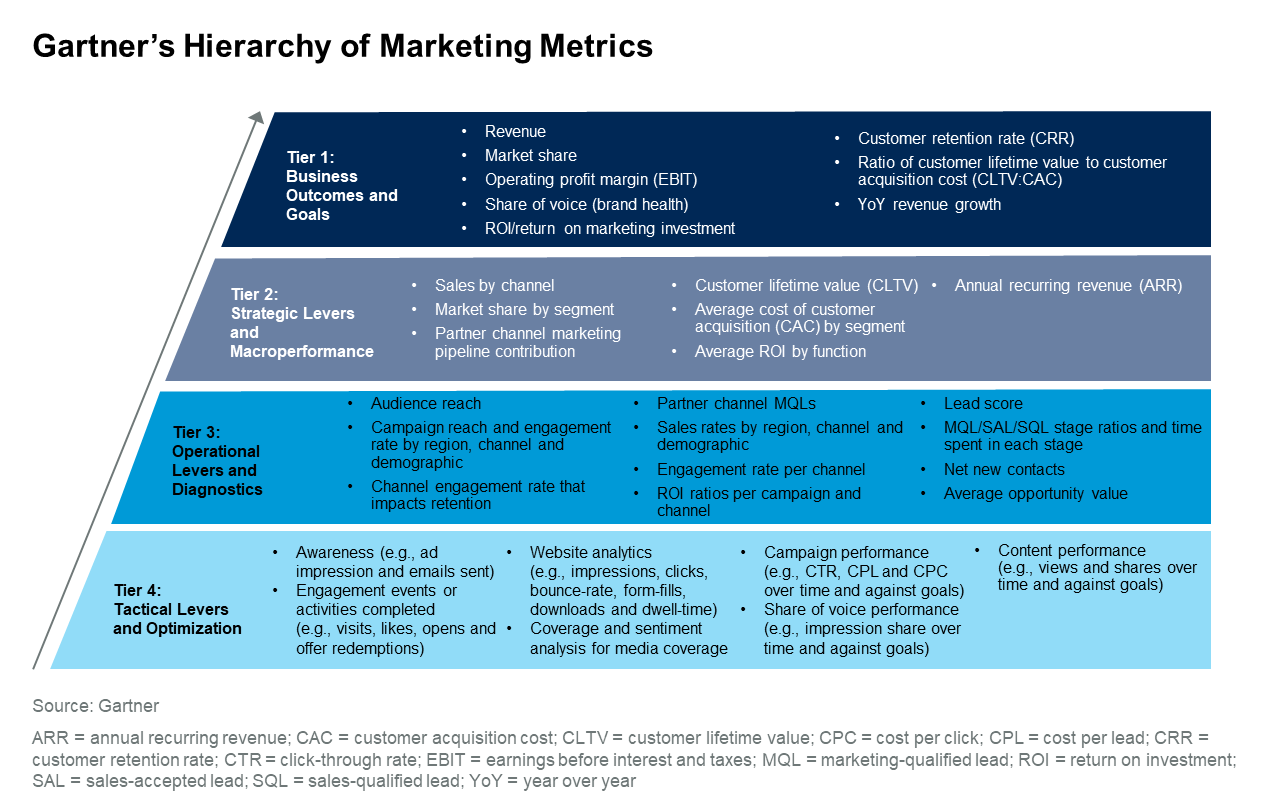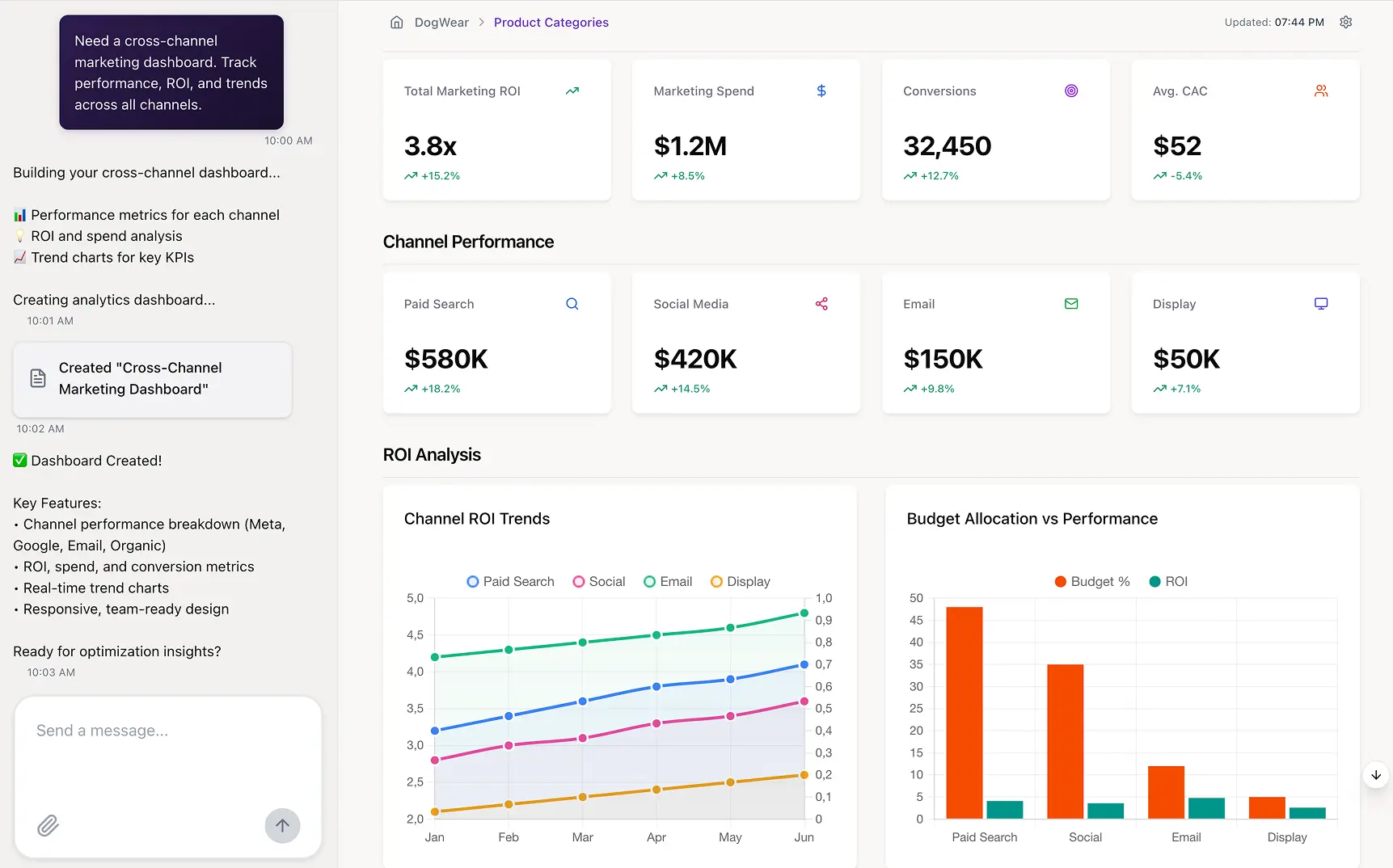How do you truly know if your marketing is working? It’s a simple question with a complex answer.
Many teams get lost tracking clicks and impressions. But true marketing effectiveness goes much deeper. It measures how well your strategies achieve core business objectives and generate revenue.
This guide provides a comprehensive framework for measuring marketing effectiveness. We'll explore everything from foundational metrics to advanced measurement models. You will learn actionable strategies to measure, analyze, and dramatically improve your marketing performance.
Key Takeaways:
- Effectiveness vs. Efficiency: Effectiveness is doing the right things to hit goals. Efficiency is doing things right with minimal waste. You need both.
- Metrics Hierarchy: Adopt a structured approach like Gartner's four levels. Track activity, operational, outcome, and business metrics for a full picture.
- Core KPIs: Focus on metrics that directly link to business health. These include CAC, CLV, and ROMI.
- Advanced Models: Go beyond last-click attribution. Use Marketing Mix Modeling (MMM) and Multi-Touch Attribution (MTA) for deeper insights.
- Unified Data is Non-Negotiable: Your ability to measure effectiveness depends on clean, integrated data. Break down data silos to get a single source of truth.
What Is Marketing Effectiveness? And Why It's Not Just About ROI
Marketing effectiveness is the measure of how well a marketing strategy achieves its goals. These goals can range from increasing brand awareness to driving sales. It's the ultimate indicator of your marketing's impact on the business.
It answers the question: Did our marketing efforts produce the desired results?
While Return on Investment (ROI) is a critical component, effectiveness is a broader concept. It considers the entire marketing funnel and its contribution to long-term business health. A campaign can have a positive ROI but be ineffective at building brand loyalty, a key long-term goal.
Defining Marketing Effectiveness vs. Efficiency
It's vital to distinguish between effectiveness and efficiency. They are related but distinct concepts.
- Effectiveness is about achieving the desired outcome. It's about "doing the right things." Are you targeting the right audience with the right message to meet your goals?
- Efficiency is about optimizing resource usage. It's about "doing things right." Are you achieving your goals with the minimum amount of time, money, and effort?
You can be efficient but ineffective. For example, you might run a very low-cost email campaign (efficient) that generates zero qualified leads (ineffective).
The goal is to be both: drive meaningful results in a cost-effective way.
The Core Components: Reach, Engagement, Conversion, and Retention
Effective marketing works across the entire customer lifecycle. We can break it down into four key components:
- Reach: How many relevant people are you connecting with? This is the top of the funnel, focusing on brand awareness and visibility.
- Engagement: Are you capturing your audience's attention? This measures likes, shares, comments, and time spent with your content.
- Conversion: Are you driving action? This tracks how many people complete a desired goal, like making a purchase or filling out a form.
- Retention: Are you building loyalty? This looks at repeat purchases, customer lifetime value, and churn rate.
A truly effective marketing strategy performs well across all four areas. It builds a sustainable growth model, not just short-term wins.
Moving Beyond Vanity Metrics
Vanity metrics are numbers that look impressive but don't translate to business results. Think social media followers or page views without context. While they can indicate activity, they don't measure effectiveness.
Focus instead on actionable metrics. These are numbers that provide insight and help you make better decisions. For example, instead of just tracking website traffic, track traffic-to-lead conversion rate. This shift is fundamental to measuring true marketing effectiveness.
The Four Levels of Marketing Effectiveness Metrics (Gartner Model)

Gartner's hierarchy of marketing metrics provides a structured way to evaluate performance. It moves from basic activities to high-level business impact. This framework ensures you have a comprehensive view of your marketing efforts.
Level 1: Activity Metrics (The Foundation)
Activity metrics track the execution of marketing tasks. They measure the volume of work your team is doing. These metrics are foundational but don't show the full impact.
- Examples: Number of emails sent, social media posts published, ad campaigns launched, blog articles written.
- Purpose: They confirm that strategies are being executed. They help in understanding resource allocation and team output.
Level 2: Operational Metrics (Measuring Efficiency)
Operational metrics measure the efficiency of your marketing processes. They help you understand how well resources are being used. These metrics connect activities to costs.
- Examples: Cost Per Lead (CPL), campaign spend vs. budget, lead response time, email open rates.
- Purpose: They identify opportunities for process improvement and cost savings. They help optimize the internal workings of your marketing department.
Level 3: Outcome Metrics (Connecting to Goals)
Outcome metrics assess the direct results of your marketing campaigns. They are closely tied to specific business objectives. This is where you start to see the real impact on the audience.
- Examples: Lead-to-customer ratio, Customer Acquisition Cost (CAC), conversion rates, marketing-qualified leads (MQLs).
- Purpose: They demonstrate how well marketing campaigns are performing. They connect marketing activities to tangible results like leads and sales.
Level 4: Business Metrics (Proving Value)
Business metrics measure marketing's overall contribution to the company's financial health. These are the metrics your CFO and CEO care about most. They provide the ultimate proof of marketing's value.
- Examples: Return on Marketing Investment (ROMI), Customer Lifetime Value (CLV), market share growth, revenue attributed to marketing.
- Purpose: They align marketing with high-level business strategy. They justify marketing budgets and demonstrate its role as a revenue driver, not a cost center.
Essential KPIs to Measure Marketing Effectiveness
While the Gartner model provides structure, a few Key Performance Indicators (KPIs) are universally critical. These KPIs directly reflect the health of your marketing engine and its impact on the business.
Customer Acquisition Cost (CAC)
CAC measures the total cost of acquiring a new customer. To calculate it, divide your total sales and marketing spend over a given period by the number of new customers acquired in that period.
Formula: (Total Marketing Costs + Total Sales Costs) / Number of New Customers Acquired
A low CAC is generally better, but it must be viewed in context with customer value.
Customer Lifetime Value (CLV or LTV)
CLV is the total revenue a business can expect from a single customer account. It shows the long-term value of your customer relationships. A high CLV indicates a healthy business with strong customer loyalty.
Formula: (Average Purchase Value) x (Average Purchase Frequency) x (Average Customer Lifespan)
The Crucial CLV:CAC Ratio
This ratio is one of the most important metrics for business health. It compares the value of a customer over their lifetime to the cost of acquiring them.
A healthy ratio is typically 3:1 or higher. This means for every dollar you spend to get a customer, you get three dollars back. A ratio below 1:1 means you are losing money on every new customer.
Return on Marketing Investment (ROMI)
ROMI, often called Marketing ROI, measures the revenue generated by a specific marketing campaign against its cost. It provides a direct link between marketing spend and financial return.
Formula: ((Sales Growth from Marketing - Marketing Cost) / Marketing Cost) x 100
This metric is crucial for budget allocation. It helps you identify which campaigns are most profitable and deserve more investment. Effective ROI measurement is fundamental to proving marketing's financial contribution.
Advanced Models for Measuring Marketing Effectiveness
Relying on simple, single-touch attribution is no longer enough. The modern customer journey is complex. To understand true effectiveness, you need more sophisticated measurement models.
Marketing Mix Modeling (MMM): The Top-Down View
MMM uses statistical analysis on historical data. It looks at sales, marketing spend, and external factors like seasonality or economic trends.
This top-down approach helps you understand how different channels contribute to overall sales. It's great for strategic budget allocation across high-level channels like TV, digital, and print.
Multi-Touch Attribution (MTA): The Bottom-Up View
MTA analyzes individual user-level paths to conversion. It assigns value to each touchpoint a customer interacts with before converting. Different models exist, like linear, time-decay, or U-shaped. MTA is highly granular.
It's excellent for optimizing digital campaigns and understanding how channels work together. A proper marketing attribution strategy is key to understanding the full customer journey.
Unified Measurement Models: The Best of Both Worlds
Unified measurement combines the strengths of MMM and MTA. It uses MMM's top-down analysis for strategic planning. It incorporates MTA's user-level data for tactical optimization. This hybrid approach provides the most complete and actionable view of marketing effectiveness across both online and offline channels.
Comparing Marketing Measurement Models
Choosing the right model depends on your business goals, data availability, and marketing channels. Here’s a comparison to help you decide.
| Aspect | Marketing Mix Modeling (MMM) | Multi-Touch Attribution (MTA) | Unified Measurement |
|---|---|---|---|
| Approach | Top-down, aggregated | Bottom-up, user-level | Hybrid, integrated |
| Data Inputs | Historical sales, spend, external factors | Digital touchpoint data (clicks, impressions) | Combines both historical and user-level data |
| Granularity | Low (channel-level) | High (campaign, ad, keyword-level) | High (connects channel to campaign) |
| Speed of Insights | Slow (quarterly or yearly models) | Fast (near real-time) | Moderate to fast |
| Channel Focus | Online and offline channels | Primarily digital channels | Comprehensive online and offline view |
| Primary Use Case | Strategic budget planning | Tactical campaign optimization | Both strategic planning and tactical optimization |
| Key Challenge | Lacks granular detail for daily changes | Struggles with offline channels and walled gardens | Complex to implement and requires significant data |
A Step-by-Step Framework for Measuring Your Marketing
A structured approach is essential for accurate measurement. Follow these steps to build a robust system for tracking and improving marketing effectiveness.
Step 1: Set Crystal-Clear Goals
Establish precise and well-defined goals for your marketing initiatives. Clear objectives outline what you aim to achieve and provide a framework for selecting relevant metrics across different levels—tactical, operational, strategic, and business.
By setting specific targets, you ensure that every marketing effort is purpose-driven and aligned with your overall business strategy. These objectives act as a benchmark to measure success and guide decision-making throughout your marketing campaigns.
Step 2: Unify Your Data Sources
Your performance data is scattered across platforms, including analytics tools, CRMs, ad networks, attribution systems, offline sources, and more. Without unification, every analysis is fragmented, every insight incomplete, and every decision vulnerable to misinterpretation.
Consolidating your data into one coherent ecosystem is the foundation of accurate measurement. A unified dataset eliminates silos, aligns metrics across teams, and creates the single source of truth required for MMM, MTA, and executive-level performance reporting.
This is where Improvado becomes essential. It automates the entire data consolidation process, pulling together marketing, sales, revenue, and product data into a governed, analysis-ready structure. Instead of stitching spreadsheets or maintaining fragile ETL scripts, Improvado ensures every source feeds into a consistent, standardized, and fully validated dataset.
With Improvado, you can:
- Connect to 500+ marketing, CRM, analytics, and revenue platforms with pre-built, fully managed connectors
- Automatically ingest, normalize, and map metrics into unified taxonomies
- Create a single source of truth in your data warehouse for cross-channel measurement
- Standardize naming conventions, dimensions, and campaign structures with governance tooling
- Join spend, revenue, conversions, and customer lifecycle data for advanced modeling (MMM, MTA, ROAS, CAC, LTV)
- Maintain real-time synchronization across all data sources
- Use the AI Agent to query unified data in natural language for instant insights
By unifying your data with Improvado, you build the infrastructure necessary for accurate, scalable, and trustworthy marketing effectiveness measurement.
Step 3: Establish a Robust Data Pipeline
Once you've connected your sources, you need a system to manage the flow of information. A well-built marketing data pipeline automates the extraction, transformation, and loading (ETL) of data. This ensures your analytics tools are always fed with clean, up-to-date information without manual effort.
Step 4: Choose the Right Metrics & KPIs
Based on your SMART goals, select the relevant metrics from each level of the Gartner hierarchy. Connect your activity metrics (e.g., emails sent) to your business metrics (e.g., revenue generated). This creates a clear line of sight from daily tasks to bottom-line impact.
Step 5: Analyze and Visualize Performance
Data is useless without analysis and interpretation. Use business intelligence (BI) tools to visualize trends and patterns. Creating interactive KPI dashboards allows stakeholders to easily explore the data and understand performance at a glance. Look for correlations and causation to uncover powerful insights.
Step 6: Automate Reporting for Real-Time Insights
Manual reporting is slow and prone to errors. Implementing reporting automation frees up your team's time to focus on strategy instead of spreadsheets. Automated reports provide real-time insights, enabling you to react quickly to market changes and optimize campaigns on the fly.
Strategies to Improve Marketing Effectiveness Across Channels
Measuring effectiveness is the first step. The next is using those insights to improve performance. Here are actionable strategies for key channels.
Optimizing Digital Marketing Campaigns
Use A/B testing relentlessly. Test your ad copy, headlines, calls-to-action, and landing pages. Analyze your conversion funnels in Google Analytics to identify drop-off points. Reallocate your budget in real-time to the best-performing campaigns and channels based on your ROMI data.
Boosting Social Media Engagement and Conversion
Go beyond vanity metrics like follower count. Track engagement rates, click-through rates, and conversion rates from social posts. Use tools for social media analytics to understand what content resonates with your audience. Tailor your content to each platform's unique audience and format.
Enhancing Content Marketing Performance
Measure how your content contributes to business goals. Track metrics like leads generated from blog posts, conversion rates on gated content, and how many content touchpoints a customer has before converting. Use this data to create content that directly addresses customer pain points at each stage of the buyer's journey.
Increasing Lead Generation Quality
It's not just about the number of leads; it's about their quality. Work closely with your sales team to define what constitutes a Marketing Qualified Lead (MQL) and a Sales Qualified Lead (SQL). Track the MQL-to-SQL conversion rate. A low rate may indicate your marketing is attracting the wrong audience.
Common Challenges in Measuring Marketing Effectiveness (And How to Solve Them)
Measuring marketing impact is not without its hurdles. Recognizing these challenges is the first step toward overcoming them.
Challenge 1: Data Silos and Fragmentation
Data is often scattered across dozens of platforms that don't talk to each other. This makes it impossible to get a single customer view.
Solution: Invest in a marketing data integration platform like Improvado. It automates the collection and unification of data from all your marketing, sales, and revenue sources into a single, governed environment. It eliminates data silos and ensures every team works from the same accurate, consolidated view.
Improvado standardizes metrics, applies consistent naming conventions, and delivers analysis-ready data straight into your warehouse or BI layer.
Challenge 2: The Lag Effect of Marketing Efforts
The impact of some marketing activities, especially brand-building, isn't immediate. It can be hard to connect a blog post published today to a sale six months from now.
Solution: Use a mix of short-term and long-term metrics. Track leading indicators like brand search volume and share of voice alongside lagging indicators like sales. Utilize attribution models that account for time decay.
Challenge 3: Accurately Proving Marketing's Contribution to Revenue
Attributing revenue directly to specific marketing actions is the holy grail. It is also one of the biggest challenges.
Solution: Implement a multi-touch attribution model. This moves beyond simple last-click thinking and gives credit to all the touchpoints that influenced a sale. This provides a more realistic view of marketing's overall impact on revenue.
The Role of AI in Supercharging Marketing Effectiveness
Artificial Intelligence (AI) is transforming how marketers measure and improve effectiveness. It automates complex analysis and uncovers insights at a scale impossible for humans.
Predictive Analytics for Audience Targeting
AI algorithms can analyze vast datasets to predict which customers are most likely to convert or churn. This allows you to create highly targeted segments for your campaigns, improving personalization and dramatically increasing conversion rates.
AI-Driven Content Personalization
AI can dynamically change website content, emails, and product recommendations based on a user's real-time behavior. This level of personalization creates a more relevant experience for the customer, leading to higher engagement and loyalty.
Automated Campaign Optimization
AI tools can automatically adjust ad bids, reallocate budgets between campaigns, and even A/B test ad creatives in real-time. This continuous optimization loop ensures your marketing spend is always being used in the most efficient and effective way possible.
Conversational AI for Instant Insights

New tools allow marketers to ask questions about their data in plain English. Instead of building complex reports, you can simply ask, "What was our cost per lead for the new campaign in Germany last week?" This democratizes data analysis, allowing everyone on the team to make data-driven decisions quickly.
Improvado AI Agent takes this a step further by providing real-time, context-aware answers powered directly by your unified, governed data. It understands intent, surfaces only the most relevant metrics, and explains performance patterns without requiring dashboards, SQL, or analyst support.
With AI Agent, every team member, from marketing to leadership, can access accurate insights instantly, accelerating decisions across the organization.
Key Metrics for Different Marketing Strategies
The most important metrics depend on your specific marketing goals. This table outlines which KPIs to focus on for common marketing strategies.
| Strategy | Primary Metric | Secondary Metrics | Example Tools |
|---|---|---|---|
| Brand Awareness | Share of Voice (SOV) | Impressions, Reach, Social Mentions, Direct Traffic | Brandwatch, Google Trends, Improvado |
| Lead Generation | Cost Per Qualified Lead (CPQL) | MQLs, SQLs, Conversion Rate, Form Fills | HubSpot, Salesforce, Google Analytics |
| E-commerce Sales | Return on Ad Spend (ROAS) | Average Order Value (AOV), Cart Abandonment Rate, CAC | Shopify Analytics, Google Ads, Improvado |
| Content Marketing | Content-Sourced Leads/Revenue | Time on Page, Scroll Depth, Backlinks, Gated Content Downloads | Google Analytics, Ahrefs, SEMrush |
| Customer Retention | Customer Lifetime Value (CLV) | Churn Rate, Repeat Purchase Rate, Net Promoter Score (NPS) | Your CRM, Zendesk, SurveyMonkey |
| Social Media Marketing | Engagement Rate | Follower Growth, Click-Through Rate (CTR), Social-Referred Conversions | Sprout Social, Buffer, Improvado |
Conclusion
Mastering marketing effectiveness is an ongoing journey, not a destination. It requires a shift in mindset from simply executing tasks to measuring outcomes and proving value. Start by building a solid foundation. Define clear goals, unify your fragmented data, and choose the right metrics that align with your business objectives.
Move beyond basic reporting. Embrace advanced models like MTA and MMM to gain a deeper, more accurate understanding of how your marketing channels work together to drive growth. Use these insights not just to report on the past, but to optimize the future. Continuously test, learn, and iterate on your strategies.
Ultimately, true marketing effectiveness is achieved when every decision is backed by reliable data. By implementing a robust measurement framework and leveraging modern tools, you can transform marketing from a perceived cost center into a proven engine of revenue and a critical driver of business success.
.png)





.png)
